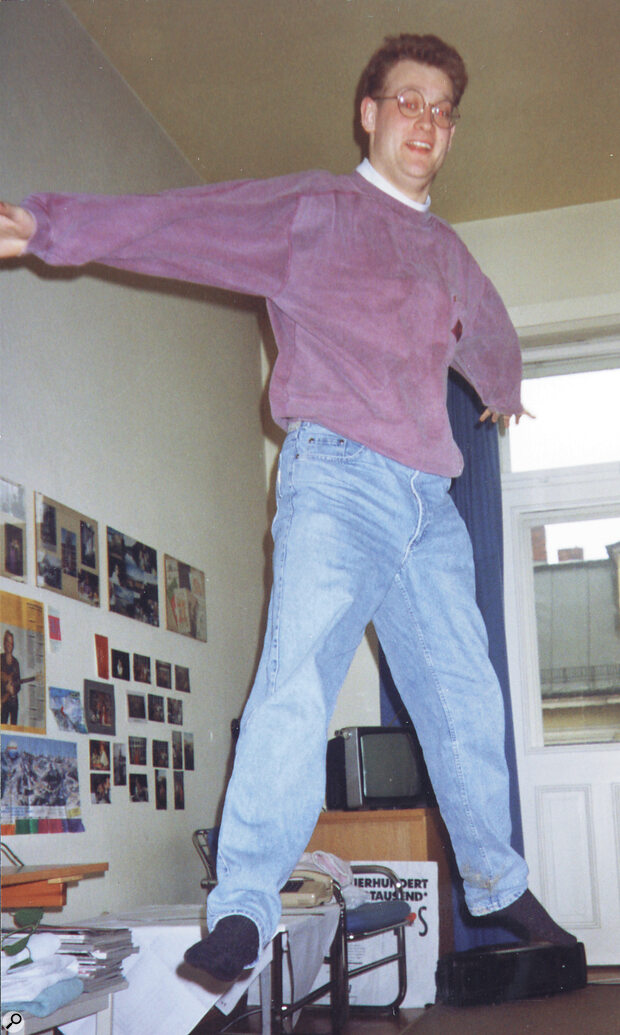Assistant Editor Matt Bell explains why the MP3 revolution will not be televised — at least, not at his house.
<!‑‑image‑>If the media are to be believed, the Internet, together with audio compression techniques like those used in MP3 encoding, is bringing about a massive shift in the way people buy, sell, and listen to music. John Walden made a very convincing argument on this very page last month in favour of the power that MP3 and the Internet could offer the typical Sound On Sound reader, by giving you a new way to promote your music globally.
However, I'm afraid I don't buy into this particular vision; I'm uncomfortable with both the idea of the Net as revolutionary sales medium and, from the other side of the virtual shop counter, as a tool to buy downloadable music. Looking at the sales side first, surely the numbers are aginst you. If, in 1997, you were in one of the few bands who could attract global attention and sales because you had music on the web for free download, you probably had an advantage over everyone else. But as every band gets on the Net and starts offering the same thing, it will not only cease to be remarkable, it may no longer even be possible for fans to find your band's music, let alone casual Net‑browsers.
This is where dedicated sites like MP3.com and Emusic.com are supposed to step in; they offer your music files for download, and boast intelligent search engines so that individuals who are into your distinctive brand of pseudo‑progressive latino‑funk handbag house with Peruvian noseflute accompaniment can find your music without too much trouble. But I would contend that a similar problem may also befall these sites; what will you do when every band from Rio De Janiero to Rotherham gets on the Net, and MP3.com and the like are crammed with flute‑wielding funksters dancing round their handbags? Let's not forget we're talking in global terms here. What if the site's search engine finds 200 bands like yours, or 200,000? In short, you might get the music of your Wolverhampton four‑piece on to the Net, but it could still be no easier for someone in Waikiki to find it than it is at the moment.
OK, so what about buying music over the Net? Again, there's been a lot of talk about this lately. In a recent article in a major monthly music mag, record company executives were heard frothing about the Net along these lines: "The Internet is a fantastic democratisation of opportunity in the global market... you can be imaginative, sexy, and creative on a web site, whereas shops have just looked like seas of plastic boxes since CDs came in". For me, this quote puts into sharp relief the insanity of the Net‑obsessed. I've been a devoted record collector for nearly 15 years, and I can honestly say I've never given a toss about whether my 'retail experience' (as these people would no doubt term a trip to a record shop) was an 'imaginative' and 'creative' one. It is, after all, the music on sale I'm interested in, not the décor.
One of the key words being bandied about in connection with web‑based music retail is 'choice' (as with digital TV, also being hyped to the skies at present). Supposedly, one of the most attractive aspects is that you can choose and download whatever you like before burning it to CD or sending it to your MP3 player. But for me, half the attraction in buying an album on CD (or just switching on BBC2, to take the visual example) is in being a passive consumer, and seeing what a band has served you up on their latest offering (or being pleasantly surprised by what you find on telly one night). Furthermore, you don't always want to choose exactly what you're going to listen to. There are times when I get in from work and just want to put an album on. I don't want to have to decide the precise tracklisting before I download it.
This brings me to another point. For me, the biggest stumbling block with MP3, Real Audio, Liquid Audio, or any of the other compression formats in which you find audio files for web download is not that the perceptual coding algorithms sacrifice too much in the way of quality (that's an argument for another day); it's that no matter how compressed they are, it's not worth the time they take to download for an evening's musical entertainment. I don't want to sit in front of a computer for ages while it all arrives, and then wait again while it uploads to a hardware MP3 player, or burns to CD. I want it now — and I also want it in a proper case, with sleevenotes, lyrics, and pictures of the band. And for all of you about to point out that Liquid Audio files have the capacity to store lyrics and links to sites with pictures of the artists and 'sleeve' artwork — I don't bloody well want to sit at my computer for even longer while they download and print out as well. Compare all this palaver to reaching out, grabbing, say, Pet Sounds off the shelf and putting it on, and there's just no contest. Speaking as someone who has had a lot of highly satisfactory service from CDNow, I say let the Net stick to what it's good at — providing an efficient, hi‑tech way to purchase music, but music in a more traditional, instantly accessible format. Long live the silver CD!
If you'd like to air your views in this column, please send your ideas to: Sounding Off, Sound On Sound, Media House, Trafalgar Way, Bar Hill, Cambs CB3 8SQ. Any comments on the contents of previous columns are also welcome, and should be sent to the Editor at the same address. Email: soundingoff@soundonsound.com

